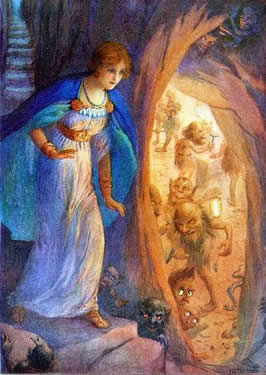Something that has been coming up a lot for me in my personal musings on spirituality this past year is the disconnect between theory and practice: what one thinks, in theory, a deity should or shouldn’t be doing, and what it is that deity actually does. Scholarship vs. individual experience–who will win?
Answer: If this becomes an either/or battle, no one does.

The disconnect in Heathen discussions between what one studies and what one experiences was crystallized for me a few months ago in an online discussion I had with another Heathen. The hot-button topic of godspouses had come up, and this person dismissed those people who had this kind of relationship with a deity as being “in denial” (or something similar). As I actually know quite a few godspouses who, as far as I can tell, are neither in denial nor crazy, I disagreed with his statement. We went through a few short rounds of polite, respectful debate (on an online forum; gasp!) before agreeing to disagree and move on.
There was no a specific point that this person made that that stuck out to me; it was that he stated that his opinion was based on academic research into ancient Greek philosophies and many different religions. (Stay with me here! I’ll explain.)
Now, I am all for researching ancient philosophies and comparing religions. I believe my own personal philosophies and spiritual views have benefited quite a bit from various classes and such that I have taken over the years (I did get a minor in comparative religion and a almost-minor in philosophy in undergrad, after all). And, with this particular example, in various cultures over the years there have been numerous examples of what today we would call godspousery—including the modern-day Catholic nuns. However, it was this person’s emphasis on his study vs their experiences that hit home. Of course! I thought. We are never going to agree. We’re discussing apples and oranges. When it comes to a topic such as spiritual beliefs and experiences, which by necessity is based on subjective experiences, how can we value one at the expense of the other?
An example of another place in Heathenry where this type of disconnect takes place can be seen in the ongoing discussions of whether Freya and Frigga are one and the same deity. Some people argue that they are two different deities; some argue that they are just localized versions the same underlying Nordic queen/mother goddess. On an academic level, convincing arguments could really be made either way. The truth is that there is just not enough surviving Lore about either goddess (or any of the goddesses, really) to prove for certain either way.


Experimentally, though, what I can say is that They feel very different. To me, Frigga feels very motherly and strong, yet also restrained and calm–a cool cucumber who can take on Odin’s vast intellect and intrigues, knows all that He knows, and be able to pull one over on Him when She decides to. Freya, however, feels passionate and lusty, fiery and emotional, mysterious and inspiring, yet also very loving and nurturing in Her way. Their energy feels to me like water running from two different faucets–one runs hot where the other runs cool. Neither is bad; they are just different.
Is there anything like the differences in how They “feel” that I describe here mentioned in the Lore? Not really. Though I can’t really speak to the Frigga side of things, having talked with many other people who have experienced Freya, both brief experiences and long-term relationships with Her, I can say that it’s a common modern experience to experience the passionate and fiery sides of Her as well as the nurturing sides, and that pretty much everyone I’ve talked to reports that She’s really focused on helping people understand and accept their individual beauty and worth. Does it tell us in the Lore that She is called on my women to help them love and accept themselves? No. (We are told by Snorri that “She is ever beloved by wicked women,” though, in my mind, that’s not exactly the same thing.)

(And, somewhat of a rant–It’s also similar to the experience I sometimes get with a person who has done amount of some academic research on Freya–or poorly-footnoted wiki versions thereof–who comes to me to tell me What She’s Really Like, because clearly I am some gullible and unread person who only talks to a disembodied voice in my head. These people tend to be the same people who go on to tell me that Freya’s just a slut, and that her husband, Odr, left her to punish Her for screwing around with dwarves. At which point, I don’t know whether I should be more offended for me or for my Goddess. Not that it really matters in the long run because, seriously, good luck getting Her help in your next love affair, dude. But, I digress.)
This is not to say that we should accept unquestioningly everything that people say about their deities. It’s more about finding the balance between drawing on the the scholarship and listening to the experiences in order for our faiths to grow and thrive. For that balance to happen, a level of discernment is definitely necessary. Ember Cooke of the EmberVoices: Listening for the Vanir blog has a great article on how to start the process of discernment when dealing with your own and other people’s unverified personal gnosis (UPG).
For a religion to thrive, followers should be supported when they have their own spiritual experiences. Not every believer is going to have Big Intense Spiritual Experiences, nor do they need to, but should that happen, there needs to be room for discussions, and room for the religion to possibly change and grow as a result. Otherwise, it devolves into mere philosophy or tradition. Useful and interesting, yes; but not spiritually fulfilling in of themselves. That’s what I’m here for, anyway: spiritual connection and fulfillment–your mileage may vary.

Patheos Pagan on Facebook.

the Agora on Facebook
Happily Heathen is posted on alternate Fridays here at the Agora. Subscribe by RSS or e-mail!
Please use the links to the right to keep on top of activities here on the Agora as well as across the entire Patheos Pagan channel.













